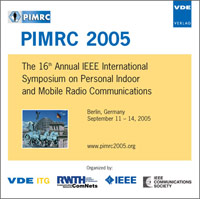On VoIP Session setup delay using SIP over correlated fading channels
Conference: PIMRC 2005 - 16th Annual IEEE International Symposium on Personal Indoor and Mobile Radio Communications
09/11/2005 - 09/14/2005 at Berlin, Germany
Proceedings: PIMRC 2005
Pages: 5Language: englishTyp: PDF
Personal VDE Members are entitled to a 10% discount on this title
Authors:
Fathi, Hanane; Prasad, Ramjee (Center for TeleInFrastruktur (CTIF), Aalborg University, Niels Jernes vej 12, 9220 Aalborg, Denmark)
Chakraborty, Shyam S. (Academy of Finland and Helsinki University of Technology, PO Box 2300, 02015 HUT, Finland)
Abstract:
In this paper, the session setup delay of the session initiation protocol (SIP) is studied. The session setup delay is a relevant metric for evaluating real-time services signalling: it has a direct impact on the user satisfaction as the user expects to wait the same time as in GSM or PSTN. The transmissions on both forward and reverse channel are assumed to experience markovian errors. The session setup delay is evaluated for different transport protocols and with the use of the radio link protocol (RLP). An adaptive retransmission timer is proposed to optimize SIP performances. Using numerical results, we find that SIP over UDP instead of TCP can make the session setup up to 30% shorter. Also RLP reduces drastically the session setup delay down to 8s even in environment with high frame error rate (10%) and significant correlation in the fading process (fDT = 0.02).


